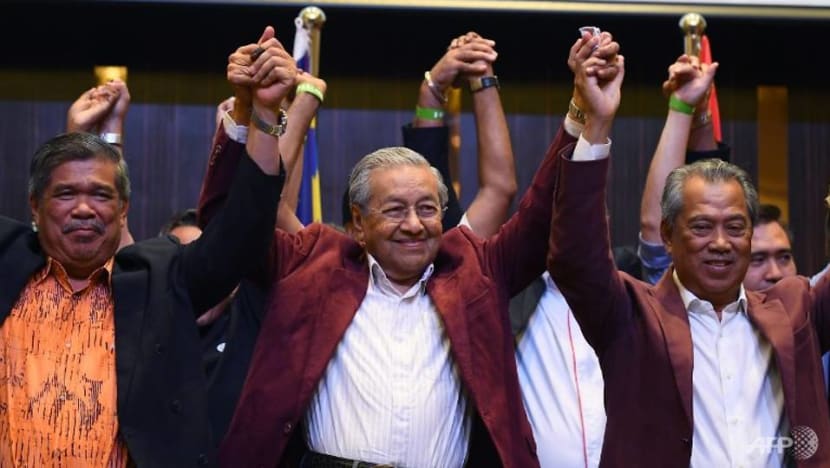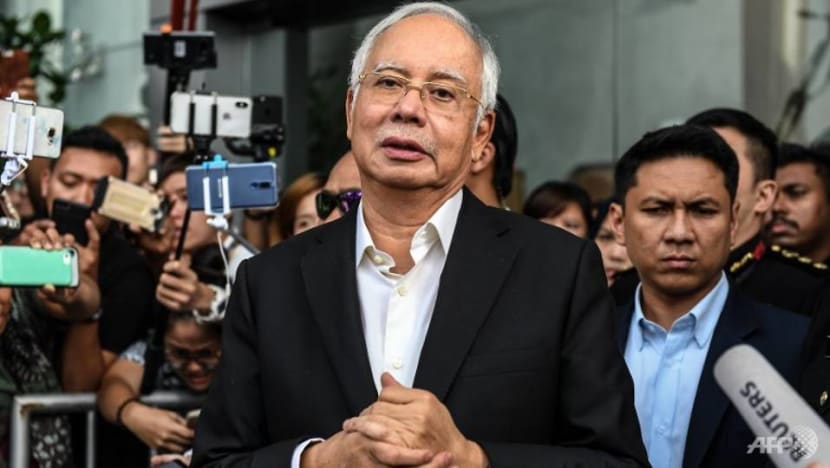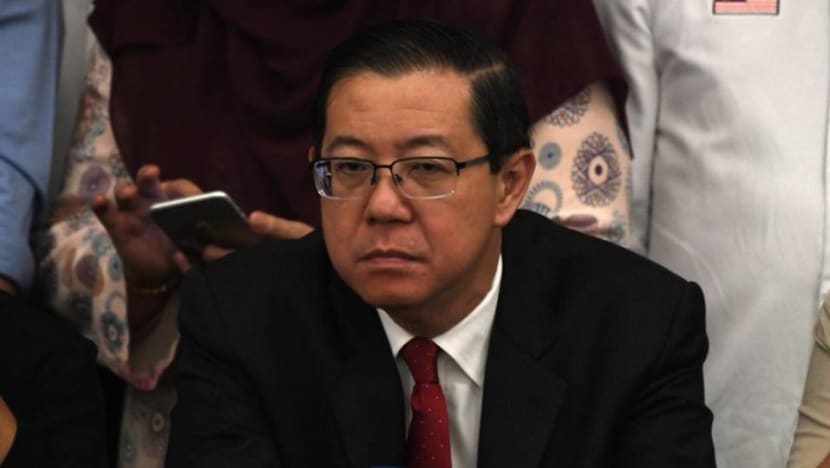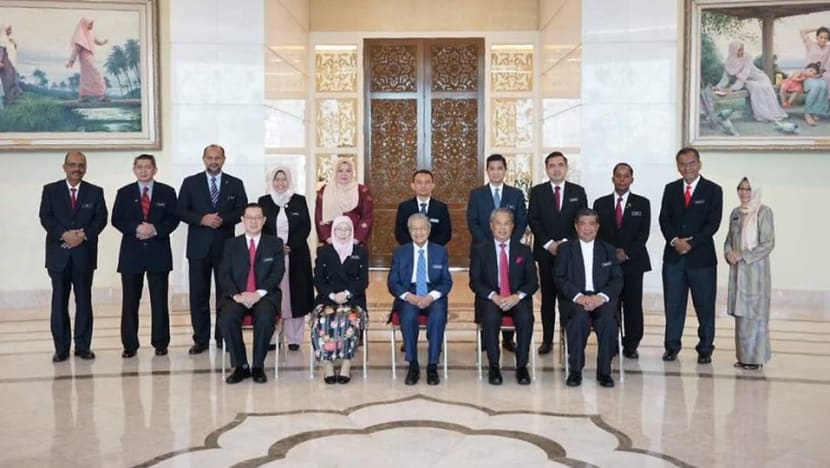commentary Commentary
Commentary: A month after the historic election, can the new Pakatan government change Malaysian politics for good?
Malaysia needs institutional changes to be effected, in order to enshrine practices of good governance, says one observer from advocacy group, the Centre to Combat Cronyism and Corruption.

Malaysian Prime Minister Mahathir Mohamad with other leaders of his Pakatan Harapan coalition following the 14th general elections. (File Photo: AFP)
KUALA LUMPUR: It’s been about a month since Malaysia decided to break up its longstanding marriage with the Barisan Nasional, and return to its first love, Prime Minister Dr Mahathir Mohamad, on May 9.
Many fondly remember the rapid economic growth Malaysia experienced at the height of his first administration in the 1980s and 1990s but others are apprehensive given memories of his harsh grip on Malaysian politics.
The whirlwind of announcements in the past month promises to cast Malaysia on the path of serious reform – the doing away of GST, a launch of investigations into 1MBD and a review of mega projects like the high-speed rail.
But a few developments suggest we should still tread lightly, and take a wait-and-see approach to monitor Pakatan’s next moves.
MANY PROMISES OF GOOD GOVERNANCE
A great deal of much needed good governance-related promises were made in Pakatan's election manifesto - far too many to list out here.
But the most critical for their first month are three promises: First, that the Prime Minister should not hold any other ministerial portfolio, especially as the Finance Minister.
Many Malaysians are tired of the alleged scandals of corruption under embattled former Prime Minister Najib Razak who assumed both roles, and may have used his power to augment his riches.
Many also remember when Dr Mahathir held both positions in the late 1990s to early 2000s.
When these roles are separated, there are more layers of checks in the approval of public spending.

A second crucial promise is the establishment of commissions of inquiry into financial mismanagement scandals involving government-linked entities such as 1MDB, FELDA, Tabung Haji and other pockets of funding that may be susceptible to significant risks of absconding suspects or the destruction of evidence.
A third is the promise of due process in the selection of two key appointment holders - that the Attorney-General's roles would be separated, with the position appointed from elected parliamentarians, and that the Malaysian Anti-Corruption Commission (MACC) chief would be selected through a parliamentary committee.
ALARM BELLS, DEEP SCARS
Alarm bells rang when Dr Mahathir announced he would also assume the Education Minister portfolio during his press conference revealing his first three ministerial appointments. The rationale was he needed to give his attention to this issue.
Some defended the move as a decisive necessity to drive education reform in Malaysia. Democratic Action Party's old supremo and former nemesis, Lim Kit Siang, rushed to Dr Mahathir’s defence to qualify that the election promise of the Prime Minister not holding multiple portfolios applied only to the Finance Minister post.
Dr Mahathir’s backtrack to appoint Dr Maszlee Malik, a Bersatu stalwart with deep Islamic credentials, allayed these fears to some extent.
But the episode highlighted how deep the scars of cronyism and corruption run in Malaysian society. Many observers are wary of actions that might amount to a concentration in the hands of the Prime Minister.
SPOTLIGHT ON THE FINANCE MINISTER
Mr Lim Guan Eng’s appointment as Finance Minister had been remarkable given that he’s the first Chinese Finance Minister appointed in decades, but the announcement also generated some apprehension where Mr Lim is still involved in graft charges waiting to be heard.

On one hand, Mr Lim has acted swiftly with great gusto as Finance Minister in reviewing past financial misdeeds and uncovering skeletons in the closet of the Malaysian government.
He has also made government spending more transparent, through publicly revealing some big-ticket projects, such as a pipeline project worth RM9.4 billion (US$2.3 billion) which has been mostly paid for but hardly completed.
It would have been preferable for Mr Lim to be absolved from corruption charges ahead of any formal appointment.
However, given the understandable urgency of forming a new cabinet, the task now remains for Mr Lim to clear his corruption charges as soon as possible, to preserve the coalition’s credibility, especially since Pakatan was elected to power on an anti-corruption ticket.
Much as voters place their trust in the new government to set things right, and Mr Lim has demonstrated decisive action in his new position, these charges may remain a potential flashpoint for the new government. Malaysians will be watching when his trial resumes in end-July.
TWO TOP ROLES
Just as crucial is the appointment of two top roles instrumental to the 1MDB investigations - the Attorney-General and the MACC chief.
Without a doubt, both appointees are excellent candidates for the job.
New anti-corruption chief Mohd Shukri Abdull was the deputy MACC commissioner who initially spearheaded 1MDB investigations and continued to focus attention on the 1MBD scandal while seeking refuge from retaliation for whistle-blowing in the US.
His appointment was approved by the Agong but did not go through parliament as Pakatan had proposed in its political manifesto.
Tommy Thomas’s appointment as Attorney-General is also well deserved, where he is a highly regarded constitutional expert and a senior figure within the legal fraternity. His appointment also squashes the myth that racial politics still determines whether individuals can take up top echelon posts in the Malaysian government.
READ: Does GE14 spell an end to racial politics in Malaysia? A commentary.

But his appointment did not follow a separation of powers of the Attorney-General’s office into the dual roles of a public prosecutor civil servant and an Attorney-General appointed from elected parliamentarians - who would act as a cabinet minister giving legal advice to the government - to avoid a conflict of interest and ensure greater public accountability.
This separation of roles had also been proposed in Pakatan’s election manifesto.
It is wonderful that capable and deserving candidates have been appointed to supremely important jobs that act as checks and balances on the government of the day. But these do not escape the fact that the due process in appointing individuals to these top posts promised by Pakatan was not applied.
STRONG INSTITUTIONS NEEDED
These episodes underscore an important long-term priority for the new Malaysian government.
The fact is, beyond 1MDB and the financial scandals at hand, Malaysia has to build practices and institutions that will safeguard against vested interests from taking root and kleptocratic predation in the years to come.
The upshot to all of this is that there is still is an opportunity to inject vigour into the course of building good institutions.
The first parliament sitting is in mid-July, a chance for the new government to show Malaysians whether these good governance promises will be instituted as codified law.

Another milestone to watch out for are the outcomes of the Council of Eminent Persons and its handmaiden, the Institutional Reform Committee.
Their proposals may hold promise of change to existing legislation that will enshrine practices of good governance for the long term. They may highlight these as key priorities for the government in the next few years.
CHANGE ON THE WAY
It is still the honeymoon period for Dr Mahathir’s second round as Prime Minister and early days as voters are still infatuated with his return.
A litmus test of whether Malaysia will continue on the right path is whether the new government makes concrete, concerted progress towards enhancing accountability to their partners, the people of Malaysia; instead of remaining one forgiven quickly through sheer force of their leader's personal charisma.
I am positive that change is on the way as the appointed ministers seem to be keen on reforming government. Time will tell if the much-needed institutional changes will be effected, beyond the quick wins and seeking of immediate justice.
Ho Yi Jian is the Open Government Initiative Officer at the Centre to Combat Cronyism and Corruption (C4 Centre), an independent good governance policy advocacy group based in Kuala Lumpur.














